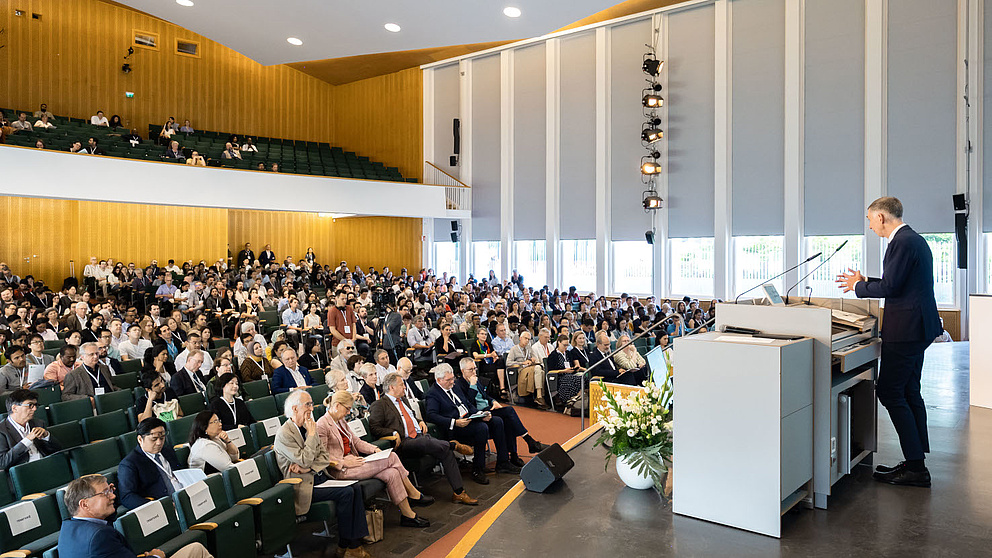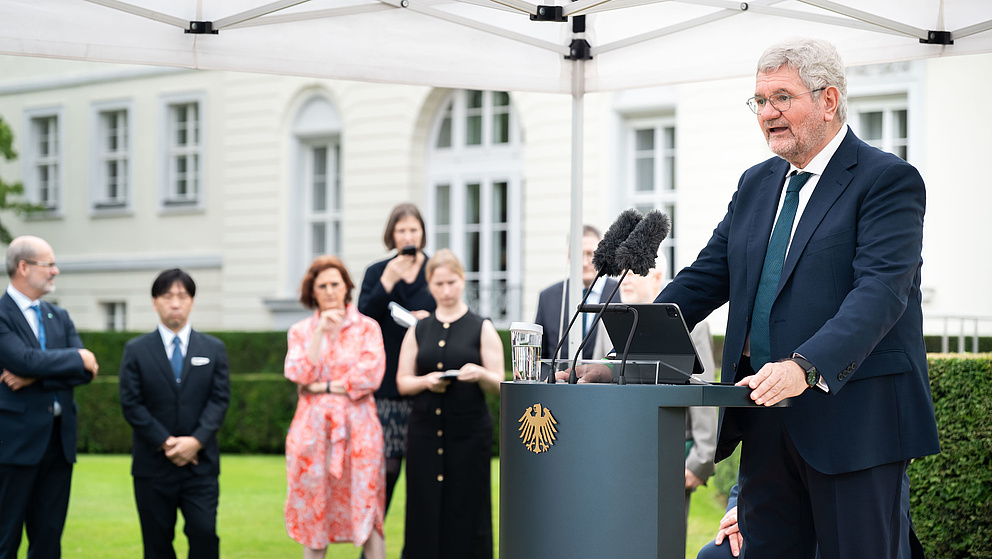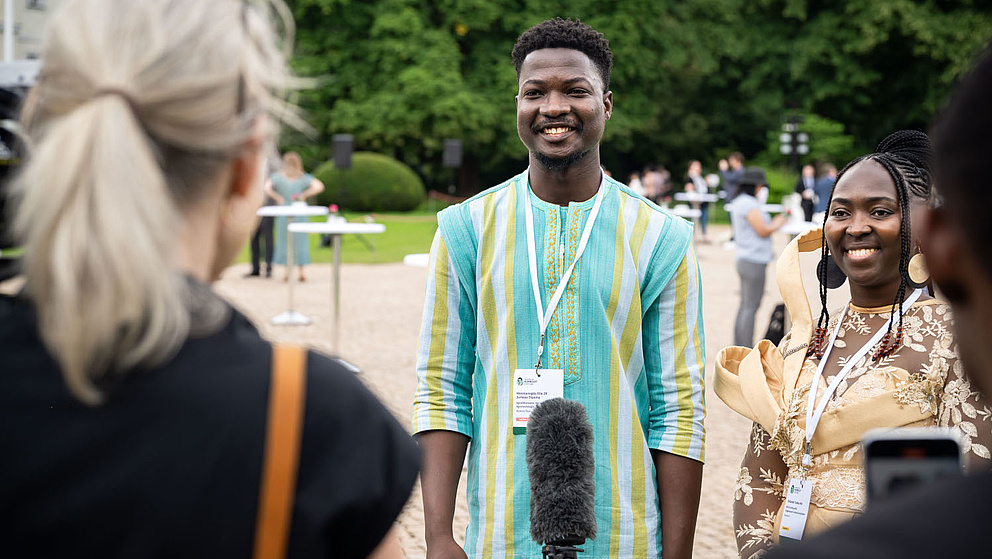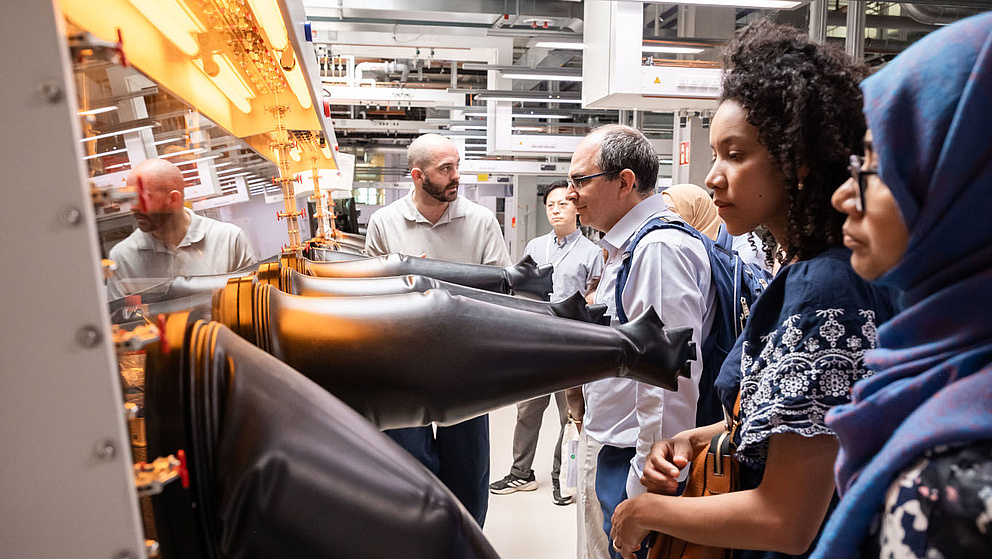Jump to the content
- {{#headlines}}
- {{title}} {{/headlines}}

Contact
Press, Communications and Marketing
Tel.: +49 228 833-144
Fax: +49 228 833-441
presse[at]avh.de
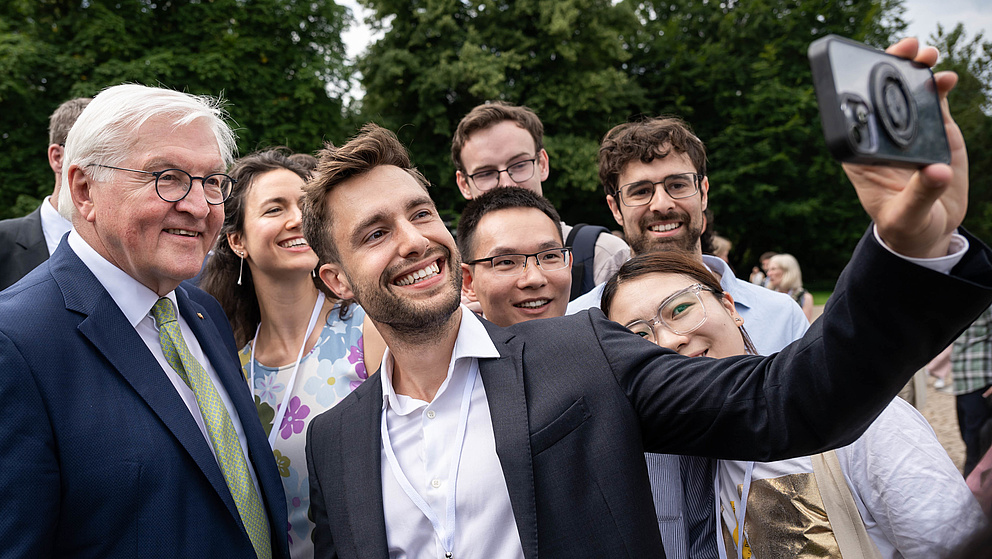
The Humboldt Foundation organised its 2025 Annual Meeting around the motto “AvH Research Unites”. Held in Berlin on 25 and 26 June, the meeting brought together individuals who are being sponsored by the foundation and are currently guests at a German university. The Annual Meeting offered these individuals and their families the opportunity to get together in person and meet other researchers who are part of the Humboldt Network. All in all, 450 researchers from 60 nations gathered to discuss research, their experiences in Germany and their home countries and to gain new perspectives.
Reception hosted by Germany’s federal president
Germany’s President Frank-Walter Steinmeier received the Humboldtians in the park at Schloss Bellevue on 26 June. In his remarks, he explored the connection between truth, reason and democracy. In many places, all is not well with the legacy of the Enlightenment and the principles of political and scientific/academic freedom. With serious consequences: “When universities and research institutes are shackled, when project funding is withdrawn at random and scientists are harassed and forced out of their profession, the rule of law and democracy are amongst the casualties”, President Steinmeier commented. For democracy in particular, it is vitally important that people discuss politics and social issues sensibly, he added. “When truth is fighting an uphill battle, the pillars of our order based on freedom are shaken to the core.”
What is currently happening on the other side of the Atlantic is a clear warning, Steinmeier noted. He admonished: “Today more than ever, the truth – in the sense of scientific findings and political sincerity – needs the support of each and every one of us more than ever before, support from society, support from politics, support from within academia itself.” Strong networks – networks that know no borders – are needed for protecting and defending free, democratic societies. And the individuals sponsored by the Humboldt Foundation are part of one such network. Through their work, they are helping ensure “that Germany remains an innovative and successful location for science and academia – a country enjoying close and friendly ties with researchers and teaching staff from around the world.”
At the reception, President Steinmeier also presented the 2025 Philipp Franz von Siebold Award to the Japanese chemist Keiichi Hirano in recognition of his exceptional research work and his outstanding contributions to fostering exchange between Germany and Japan.

#AvHResearchUnites
Opening of the Annual Meeting
In his opening remarks at the Annual Meeting, Robert Schlögl, President of the Humboldt Foundation, addressed the role science plays in society. The fact that science is being restricted and controlled in many parts of the world is an indication of the importance attached to its role, Schlögl noted. “Science raises questions – which also include uncomfortable questions. It calls things into question and conducts nuanced discussions. It requires a culture of rational political debate. Science as well as pluralistic societies are dependent on the critical analysis of their actions. Unrestricted research and democracy go hand in hand with one another; they are interdependent“, said Robert Schlögl.
“Public discourse and unrestricted science constitute a precious good for democracy.”
Regarding this year’s motto “Research Unites”, he said: “We see it as our responsibility to champion this internationalisation and make the public aware that internationalisation is an attribute of our science system.” What is most needed at present is bridge-building: between people, disciplines and nations, he added. The Foundation’s new programme, the Humboldt Placement Scheme, will promote discussions and sharing between the science community and the political sector in the future.
Ralf Beste, Head of the Department of Culture and Society at Germany’s Federal Foreign Office, began his welcome address by thanking the Humboldt Foundation for having established over the course of many decades a singular worldwide network of outstanding minds: “Thanks to the work being done by the Foundation, robust, trusting relationships between individuals are emerging in the name of science. These relationships make indispensable contributions to the foreign policy of the Federal Republic of Germany.” In an era of geopolitical upheavals and the rise of autocratic systems, Germany takes a clear stand: “We are determined to take on more responsibility for our freedom and security.” Personal ties – like those that the Humboldt Foundation establishes – are of enormous importance for cross-border dialogue, particularly in such challenging and uncertain times. He called upon the Humboldtians to “use your special connection to Germany and become ambassadors for Germany. We need you as bridge builders between your countries and Germany!” He additionally stressed, “Science and scholarship need you to stand up for freedom. We want to make it clear: Researchers, including researchers who are no longer able to work freely and productively in their home countries, are welcome in Germany.“
Video of the opening ceremony for the Annual Meeting can be viewed here
Roundtable USA
A roundtable on the subject of Transatlantic Science Cooperation in Turbulent Times was also held on 25 June. Sponsored individuals from the USA and German individuals who have completed a sponsored research stay in the USA met with representatives of the Federal Ministry of Research, Technology and Space, the Fulbright Germany organisation and the Humboldt Foundation and spoke about whether and how they are affected by current measures being undertaken by the American government. The roundtable also identified the most urgent challenges for the transatlantic research community and how the Humboldt Network can help maintain lasting research ties.
In his opening speech, Robert Schlögl commented on the situation in the United States. “The Trump administration is threatening the country’s prosperity and the capabilities of its science system over the long term; it is endangering human lives by curtailing climate and health research. This is causing further lasting damage because globally vital collections of research data are no longer accessible or are even being destroyed.”
The Humboldt Foundation is currently working in cooperation with its funding providers to expand its offerings for research stays in Germany. For example, planning is underway for offering more fellowships and supporting research groups at various career stages as part of the 1000 Heads programme announced by the new German government.
Every year, the Alexander von Humboldt Foundation enables more than 2,000 researchers from all over the world to spend time conducting research in Germany. The Foundation maintains an interdisciplinary network of well over 30,000 Humboldtians in more than 140 countries around the world – including 63 Nobel Prize winners.

